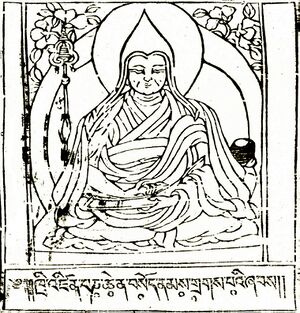No edit summary |
m (JeremiP moved page Topic of the week/Post-58 to Recent Essays/Post-58: Changing name) |
Latest revision as of 11:06, 29 April 2022
Paṇchen Sonam Drakpa’s Commentary on the Ultimate Continuum[edit]
Paṇchen Sonam Drakpa, one of the most lucid writers in the Geluk tradition and an author of the yigcha curriculum in Drepung Loseling monastic college, has authored a commentary on the Ultimate Continuum entitled the The Moonlight of the Crucial Points: A Commentary on the Difficult Aspects of the Ultimate Continuum (རྒྱུད་བླ་མའི་དཀའ་འགྲེལ་གནད་ཀྱི་ཟླ་འོད།). While he does not provide a word-by-word explanation, he carries out a highly analytical exegesis on the root verses, often carrying out polemical discussions. He starts by providing a brief overview of the five works of Maitreya and the doxographical affiliation of their content.
As he starts his exegesis on the topic of buddha-nature, starting from Verse I.28, he refutes the philosophical interpretation of Ngok Lotsāwa, Rongtön, and Dolpopa, those who hold buddha-nature to be identical with the ālaya ground and those scholars who hold the buddha-nature teachings to be provisional following Sakya Pañḍita's interpretation of buddha-nature in his Distinguishing the Three Vows.
Paṇchen Sonam Drakpa makes it amply clear in his commentary on Verses I.154–57 that he does not accept either an innate absolute buddha-nature which has all qualities of the Buddha latent in it, as do the Jonangpa scholars, or the luminous awareness of the mind, or the union of emptiness and luminosity to be buddha-nature as espoused by many scholars following the Sakya, Kagyu and Nyingma traditions. He argues that the first two lines of Verse I.154 present the essential characteristics of buddha-nature, the third line the correct view of such buddha-nature, and the fourth line the result of such view and realization. The Verse I.155 presents further arguments in support of the preceding verse. According to him, there is no need for two self-existent entities (i.e., the self of person and the self of phenomena) to be eliminated, as they never really exist, and there is no need of two non-selves (i.e., non-self of person and non-self of phenomena) to be newly added or maintained, as buddha-nature is by nature defined by lack of self-existence. Similarly, buddha-nature is empty of the separable adventitious impurities, as the impurities do not exist in its nature, and it is not empty of the inseparable qualities of the Buddha because it has the capacity for the Buddha's qualities to manifest. Sonam Drakpa considers the buddha-nature teachings to be definitive, in contrast to Sakya Paṇdita's interpretations of the buddha-nature teachings.
Weekly quote[edit]
~

